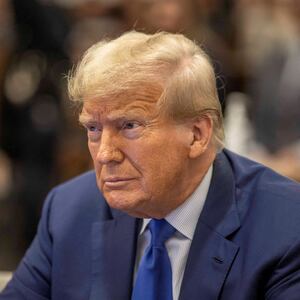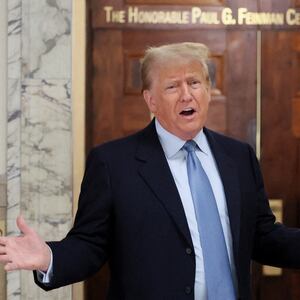How do you restrain the free speech rights of a man who will say anything, has perhaps the largest microphone in the world, and has thousands of devoted followers who will follow his orders?
The question is proving to be a vexing one as the Department of Justice jockeys to defend a blanket gag order against Donald Trump—and the three-judge panel on D.C.’s appellate court showed some skepticism that the current restrictions were appropriate.
The stated purpose of the gag order is to prevent the former president from intimidating witnesses in his 2020 coup case in D.C. But on Monday, the feds found themselves in an impossible spot—laying out free speech limits that bordered on Orwellian while knowing that anything short could give Trump the wiggle room to provoke threats and even violence.
During court arguments in Washington reviewing the trial judge’s gag order, the judges seemed to understand the need to impose limits on Trump’s non-stop barrage of online threats against prosecutors and witnesses. But at least one appellate judge seemed perturbed by the extent to which the U.S. government is trying to silence the leading Republican presidential candidate ahead of the 2024 elections.
The courtroom debate highlighted the unprecedented difficulties of a Justice Department going after a former president who, in turn, seethes against the very government he once led—while simultaneously abiding by the American principles of free speech and expression.
They debated U.S. District Judge Tanya Chutkan’s Oct. 17 order, which said the former president can go on campaigning and claiming the prosecution is politically motivated—but he can’t keep individually targeting court staff, prosecutors, and witnesses.
Chutkan’s powerful decision came after Trump kept directing his hate toward the judge herself, calling Special Counsel Jack Smith “deranged,” and deriding prosecutors as “thugs.” Notably, Trump said his administration’s top military official—General Mark A. Milley—was a “traitor” who supposedly committed a crime that “in times gone by, the punishment would have been DEATH!”
Naturally, Trump immediately responded to the gag order by trashing Judge Chutkan.
The D.C. Circuit Court of Appeals is reviewing that situation now, and the stakes are as high as Trump Tower. His hostile rhetoric already led to at least one death threat against Judge Chutkan. But his fervent MAGA brigade is already interpreting any legal attempt to limit him as a sinister plot to prevent his return to the White House.
The prospect of Trump-inspired political violence is real enough that MAGA threats now have a name. On Monday morning, Appellate Judge Cornelia Pillard coined a term when she discussed her concern about “comments that will trigger the loyalists' zeal.”
But the judges recognized the inherent difficulty in muzzling Trump effectively but fairly.
One contentious back-and-forth encapsulated the tension on Monday, as Judge Patricia A. Millett questioned the way the DOJ wants to use the lower court’s gag order to stop Trump from publicly commenting on what he thinks of a witness’s credibility. Millett posed a hypothetical scenario in which one of Trump’s many former lieutenants testifies against him at trial, then joins a campaigning Democratic politician onstage to discuss Trump’s authoritarianism.
“You're telling me former President Trump, the First Amendment... would not allow him to say Mr. X is a liar? He's lying in what he said? He can't say that?” Millett asked incredulously.
“He can say, 'I was a good president,’” DOJ lawyer Cecil Woods VanDevender responded.
Prosecutors promised they wouldn’t use the gag order as a weapon to request the judge jail Trump in that kind of situation, but the appellate judge wasn’t satisfied.
“I don’t want to know what the government will move on. I want to know what's in the order,” she said. “He can say they're an untruth speaker… but he can't say they're a liar?”
“Yes,” VanDevender said.
The distinction between “untruth speaker” and “liar” didn’t seem to convince Millett.
"We've got to use a careful scalpel here,” Millett later warned. “We live in a free society where it's incredibly hard for the government to lock someone up. It has to be. That's the tool of oppressive governments.”
The line of questioning from appellate judges suggested that they intend to pare down Chutkan’s gag order. If they do so, it will follow a similar situation in New York City. Last week, an appellate judge temporarily suspended a New York state judge’s gag order that prohibited Trump from directly attacking a law clerk and directing his MAGA loyalists at court staff in the midst of his bank fraud trial.
However, the bulk of this morning’s two-hour court hearing showed that the appellate judges recognize the need to place some sort of limit on Trump’s increasingly belligerent comments to his right-wing followers.
John Sauer, who was once Missouri’s top lawyer and now represents Trump, asserted that the billionaire can do as he pleases—and no one should set up any restrictions ahead of time.
Appellate Judge Cornelia Pillard pointedly noted that she found it “instructive” that Trump’s side “gives so much credence to the First Amendment”—but none whatsoever to judicial orders seeking to ensure public safety.
The aftermath of the Trump-inspired Jan. 6 insurrection hung high in her line of inquiry. Pillard questioned how Trump’s side would justify a hypothetical situation—albeit one that perfectly comports with the former president’s past behavior—in which Trump attacks ex-Vice President Mike Pence the night before he testifies at the upcoming Washington trial by taking to TruthSocial to say, “Mike Pence can still fix this, Mike Pence can still do the right thing.”
It was a clear reference to the last time Trump tried to intimidate his vice president on Jan. 6, 2021.
“That would be more problematic than the statements we have on the record. But is there any reasonable prospect for influencing Mike Pence's testimony?” Sauer asked.
“Does that count as a communication to a witness?” Pillard probed.
“Depends on the context,” he shot back.
“It's tweeted out on his social media... you're not going to get any more context,” Pillard replied, refusing to budge.
Sauer then argued that Trump shouldn’t be barred from “just broadcasting... openly to the media,” and repeatedly asserted that any free speech limits would only be justified after a mini-trial that would be triggered after making the comment. The arguments echoed Trump’s no-rules approach to governing that he displayed during his real estate tycoon days in 1980s New York and during his one-term presidential administration.
“There's no prophylactic rule, no circle around that communication with witnesses, that the district court could draw?” Pillard asked with a voice of surprise.
“That would have to be based on a compelling evidentiary showing,” Sauer replied.
When Appellate Judge Bradley Garcia noted that most of the examples of Trump’s threats came from 2020, the DOJ laid out the stark issues at play—reminding the judges that the same threat on display during the attempted coup continues today. The MAGA vitriol that was once directed at elections officials and poll workers for doing their jobs honestly and fairly is now being aimed at judges and prosecutors in Georgia, New York, and Washington for seeking to hold Trump accountable for alleged past crimes.
“This is exactly the core of what this case is all about—the period after the election,” VanDevender said. “The notion that there's some dynamic that existed in 2020 that has abated or gone stale is certainly wrong.”









